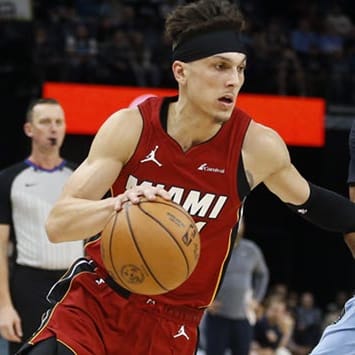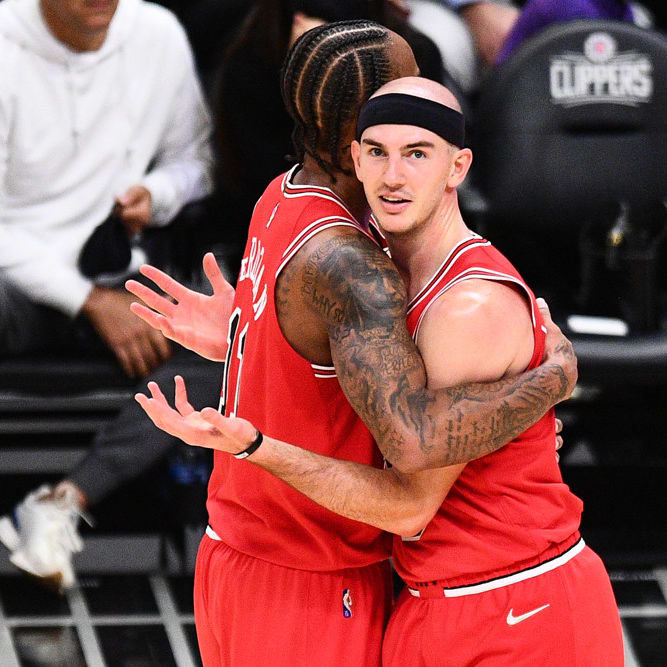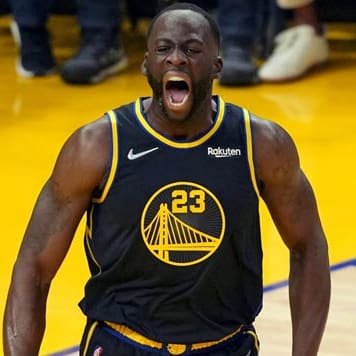This article is part of our The Prospect Post series.
WHAT COULD GO WRONG
This article aims to provide an ongoing evaluation of the NBA's rookie class from a fantasy standpoint while also offering deep dives on college players with bright futures. Projecting young talent is very subjective, so an open dialogue is encouraged, both in the comments section and on Twitter: @RealJRAnderson
With the season just about to get underway, all of the top rookies still have wide-ranging expectations among fantasy owners and armchair evaluators. We spend so much time hyping prospects for what their ceiling is and dreaming of what could be. But for my first contribution to this space, I want to go in the other direction and discuss what could go wrong for some select prospects, and what factors would lead to them underperforming, relative to where they will be drafted in fantasy leagues this season. (Yes, this is a tip of the cap to an old series of articles written by Jason Parks, formerly of Baseball Prospectus and now a scout with the Chicago Cubs.)
What could go wrong: Flip Saunders could become every Wiggins owner's chief enemy. Look at the Timberwolves' roster. There are three players who have been sufficient NBA small forwards in the past: Corey Brewer, Chase Budinger and Thaddeus Young. Even when acknowledging that Young will primarily play power forward for Minnesota, he could still play some three if Nikola Pekovic and Gorgui Dieng are ever deployed together. There is also another former No. 1 overall pick, Anthony Bennett, who will inevitably play some small forward because of the three aforementioned options at the four and five. One wouldn't expect Minnesota's backcourt to impact Wiggins' minutes, but with five guards -- Ricky Rubio, Mo Williams, J.J Barea, Kevin Martin and Zach LaVine -- expected to be in the rotation, there will likely be times when Saunders opts for a three-guard lineup, which would sideline Wiggins. Of course, all it would take is a couple injuries on the roster to eliminate this concern, but if Wiggins has a bad two weeks, and Saunders is set on winning over developing, he could conceivably start trying to teach by cutting Wiggins' minutes and opting for more of a veteran presence in the rotation. Wiggins' biggest detractors will say that an underwhelming rookie season could be caused by a lack of aggression, but in my estimation, a less aggressive Wiggins means a more efficient Wiggins. This is a player who could shoot 50 percent from the field with above average rebounding numbers and excellent defensive stats, while also being at least a top-3 scorer on the T-Wolves if he's selective with his shot, so a dearth of me-first plays on offense wouldn't necessarily harm his fantasy value in roto leagues. Remember, as a freshman who wasn't aggressive he was the leading scorer on a Kansas team that won the Big 12 and was a title contender prior to Joel Embiid's injury, despite having one of the hardest schedules in the land.
What could go wrong: It would be shocking for Parker to not finish as a top-75 player in fantasy if he stays healthy, and that's probably conservative. But, like most rookies, he has his flaws. He won't be an asset in steals or blocks. In the preseason he flashed the ability to set up his teammates, but the Bucks need him to score, and his assist totals will be subpar. It won't take long for opposing teams to put their best defenders on Parker, and he may even see some double teams, which is extremely rare for a rookie, but given the team context, it wouldn't be shocking. This could lead to a below-average field-goal percentage. LeBron James shot 41.7 percent from the field as a rookie, and he was in a similar situation as Parker. At Duke, Parker shot 74.8 percent from the free-throw line, which isn't bad, but it's not going to help a roto team, especially considering how many free throws he'll be attempting per game. Carrying the Bucks will not be easy, so there's a chance Parker could hit a significant rookie wall, which will be especially detrimental for owners in head-to-head leagues. However, all of these things could happen, and Parker may still end up winning rookie of the year and finishing as a top-50 player in fantasy because of how high his floor is.
What could go wrong: First-year coach Quin Snyder could decide that Exum isn't ready to play fantasy-significant minutes. This wouldn't be surprising, especially if Alec Burks has a breakout year, which seems likely. Trey Burke is a below-average NBA point guard, but he has seniority over Exum, and one would imagine the Jazz will give Burke another season to show what he can bring to the table as the floor general. Because Exum will often be playing out of position at shooting guard, his lack of strength will make him a defensive liability at times, which will also make it easier for Snyder to curtail the rookie's minutes. For these reasons, the onus is on Exum, not the coaches, for him to play so well that the Jazz have no choice but to give him 28-32 minutes per game. Assuming he sees closer to 24 mpg, it's difficult to invest in him in most leagues.
What could go wrong: Based on how late Gordon is going in drafts, there's not much room for downside. That said, he'll have to be pretty productive to make up for his well-below average free-throw shooting. In one season at Arizona, Gordon shot 42.2 percent from the line on 180 attempts. It's hard to imagine him not shooting at least 55-60 percent as a rookie, given the amount of work he's put in at the line since the end of the college season, but he will probably be one of those guys like Blake Griffin and Tim Duncan, where his ceiling as a free-throw shooter is around 70 percent, and that probably won't happen right away. Gordon will be an asset in rebounds, but despite a high-energy approach and elite athleticism, he has yet to show that he can be a significant contributor in blocks and steals, and he will need to be in order for fantasy owners to feel justified in starting him this season.
What could go wrong: It is clear that Smart will be a big-time factor on the defensive end immediately. He average 3.0 steals as a freshman and 2.9 steals as a sophomore at Oklahoma State, and has posted similar numbers in the preseason. However, there's a chance that steals will be the only category where Smart will be an asset. He shot 41.3 percent from the field and 29.5 percent from beyond the arc over his two years in college, so he will need to make significant improvements to become an average NBA shooter for his position. There's also the issue of Rajon Rondo, who certainly won't be giving up ball-handling duties, barring an injury. Smart is excellent at getting into the lane and using his strength to finish around the rim, but if he's playing primarily off the ball, his weaknesses as a shooter could be exposed. Rondo's existence could also make it difficult for Smart to post even low-end assist totals for a fantasy point guard. With news that Rondo (fractured hand) could be ready for the season-opener, Smart is likely to either start the season coming off the bench, or playing out of position, and neither scenario is likely to lead to quality across-the-board fantasy production.
What could go wrong: Randle's per-minute numbers as a freshman at Kentucky and Carlos Boozer's 2013-14 per-minute numbers with the Bulls are almost identical, except Randle shot 50.1 percent from the field, while Boozer shot 45.6 percent from the field. If everything was equal, the Lakers would probably opt to give the younger, more explosive player the starting power forward job. However, there are several things working against Randle. Kobe Bryant and coach Byron Scott seem highly unlikely to entrust a significant portion of the offense to Randle, who may already be the team's most efficient one-on-one scorer. Scott is already brazenly proclaiming that he doesn't think three-pointers win championships. He's old school to a fault. Meanwhile, Bryant is selfish to a fault. There's no way Bryant would enjoy seeing Randle emerge as a future face of the franchise, and a 1B to Kobe's 1A on the offensive end. Boozer, on the other hand, would be more than willing to fall in line as a good soldier on Bryant's suicide mission of ball and shot domination. The Lakers have no interest in straight-up tanking/rebuilding either, as the team's finances take a direct hit when the team isn't perceived to be trying to win. Scott has already benched Randle in a preseason game for "lack of effort," so there is friction there. Randle's minutes peaked at 27 in the first game of the preseason, and have plateaued at around 18-20 mpg since then, so it's looking pretty clear that the talented rookie will be a rotation player to start the season, even though his skills suggest he should be much more than that.
What could go wrong: He is not without competition for minutes at the one. Luke Ridnour and Victor Oladipo will both see run at point guard this season for the Magic, so minutes are an immediate concern. However, I think the idea of a Payton/Oladipo backcourt appeals to the Magic long-term, so it would be odd for them to not give the rookie every chance to solidify a dominant share of the point guard minutes. A major problem here could be the perceived value Payton will have on draft day. Grantland's Bill Simmons predicted Payton will win rookie of the year, so he's far from under the radar. He recently went in the sixth round of my 10-team hometown head-to-head points league, so if you want him, you have to really WANT him. There is a solid chance he could develop into a Rajon Rondo-esque player, where his lack of three-point shooting is made up for by his assists and steals. But the fact is, he can't shoot threes or free throws at even an average clip. He averaged 19.2 points on 50.9 percent shooting as a junior at Louisiana-Lafayette, but he also shot 25.9 percent from three (54 attempts) and 60.9 percent from the free-throw line. Of all the players in this post, Payton has the highest variance in terms of where he's getting selected in fantasy leagues. Those in points leagues or those punting free-throw percentage, should invest highly in this player, but he's not worth a gamble in the early rounds of roto leagues based on the poor shooting percentages.












